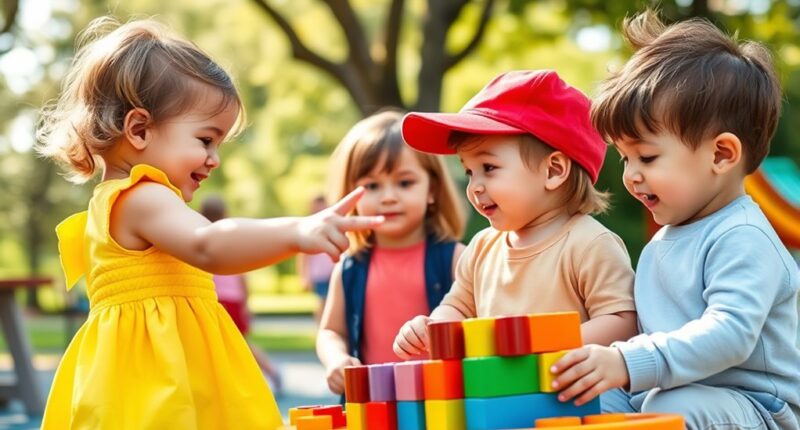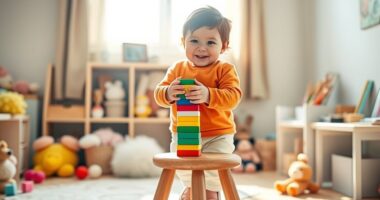During toddler development, social skills grow rapidly through peer interactions and caregiver influences. You’ll notice milestones like smiling, playing alongside others, and engaging in cooperative play. Caregivers foster these skills by providing a nurturing environment and modeling social behavior. As toddlers participate in various types of play, they enhance their emotional regulation and understanding of others. This early socialization paves the way for lifelong benefits in relationships and emotional intelligence, and there’s much more to discover about this fascinating journey.
Key Takeaways
- Infants begin social interactions by vocalizing and smiling, laying the groundwork for future peer interactions and social skills development.
- Caregivers play a crucial role in fostering a nurturing environment that enhances social capabilities through quality interactions and modeling behaviors.
- Types of play, such as parallel, associative, and cooperative, significantly influence toddlers’ social skills and their ability to form connections with peers.
- Emotional regulation is vital for toddlers, as managing emotions impacts their interactions and ability to respond appropriately in social situations.
- Early nurturing of social skills leads to long-term benefits, including improved relationships, academic success, and enhanced overall life satisfaction.
Age-Related Milestones in Social Skills Development
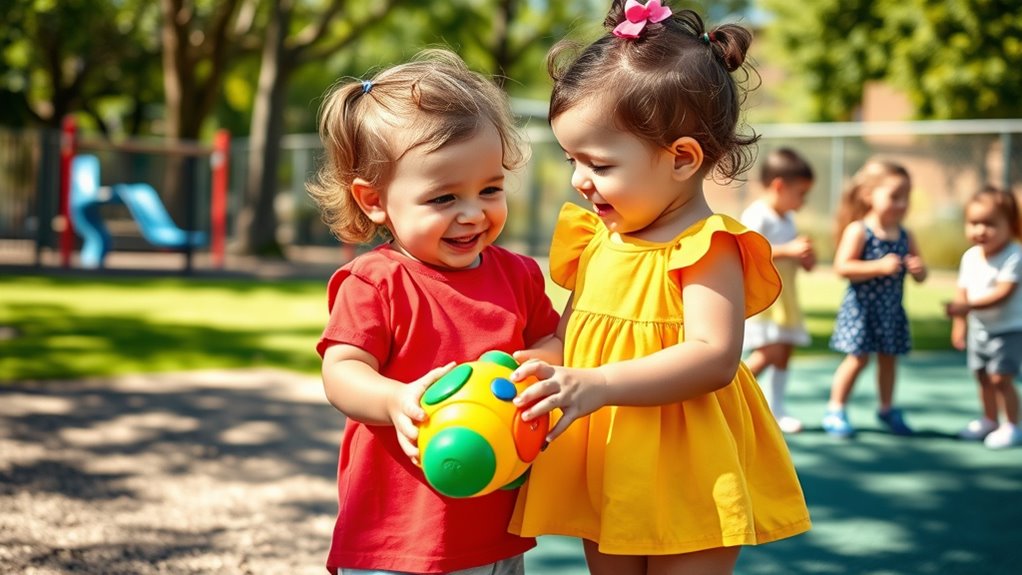
In the first year of life, infants begin to lay the groundwork for social skills development. You’ll notice your baby vocalizing in response to adults, which sparks initial social interactions. When they smile or playfully engage with their reflection in a mirror, it shows budding self-awareness. Self-watering planters can also be a great way for parents to engage in playful interactions with their children as they explore plant care together.
Through cuddling, they establish attachment and trust with you, recognizing their name and responding when called. As they manipulate toys, they enhance problem-solving skills. Transitioning into late infancy, your child starts engaging in playful interactions, imitating adult actions, and responding to emotions. This early socialization is crucial for their future development and can be supported by newborn feeding options that provide the necessary nutrients for growth. Additionally, early emotional connections formed during this stage are vital for fostering social skills later in life. Engaging in gentle methods during playtime can further enhance emotional well-being and attachment, setting a strong foundation for social skills. Establishing consistent routines in both households can also help toddlers feel more secure during their developmental stages.
The Role of Caregivers in Fostering Social Interactions

While caregivers provide a nurturing environment, they also play an essential role in fostering social interactions that shape a toddler’s development. By creating a predictable atmosphere, you help your child feel secure, which builds trust and reduces anxiety. Engaging in interactive play strengthens your emotional bond and encourages effective communication. As you model appropriate social behaviors, your child learns empathy and how to relate to others. Additionally, understanding the risks of toxic relationships can help you guide your child in forming healthy connections. Incorporating educational toys into playtime can further enhance their social skills as they learn to share and cooperate with peers.
Arranging playdates and exposing them to new social situations broadens their social network. These experiences can also enhance their emotional and psychological growth as they learn to navigate various social dynamics. Through storytelling and role-playing, you prepare them for various social scenarios. Additionally, these experiences can help children develop important social skills that are crucial for future interactions. Research shows that opportunities for socialization during early childhood significantly influence emotional regulation and communication abilities, laying the groundwork for future relationships.
These consistent interactions not only enhance emotional stability but also support brain development, laying the groundwork for future relationships and social skills.
Types of Play and Their Impact on Social Skills
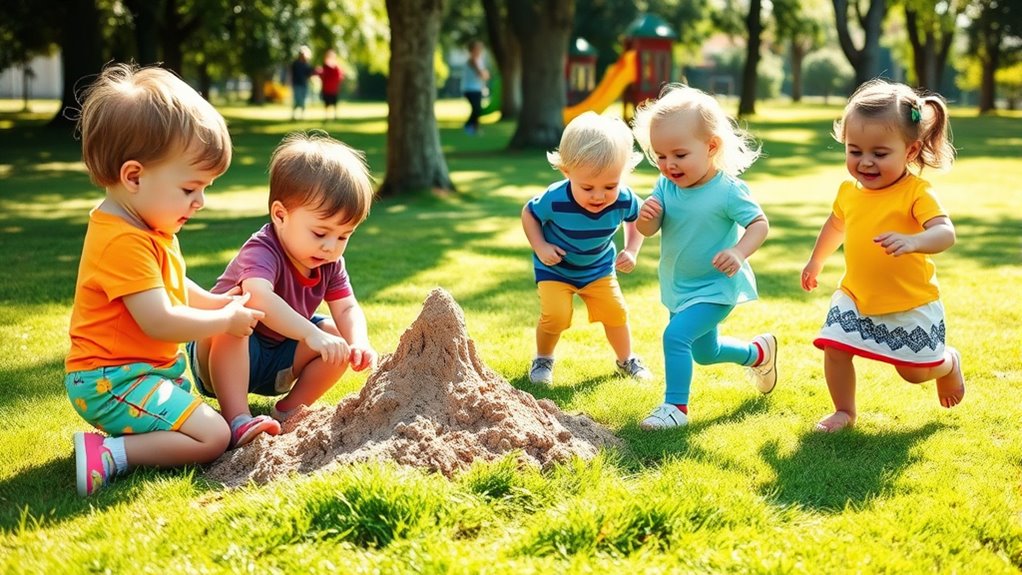
Caregivers play a significant role in shaping a toddler’s social skills, but the types of play children engage in also have a profound impact on their development.
For instance, parallel play allows toddlers to explore alongside peers, laying the groundwork for future interactions. As they evolve to associative play, basic communication begins, fostering initial social connections. Engaging in hands-on learning through these play types can further enhance their social skills. Research indicates that socialization in early dog training can similarly facilitate effective interactions in animals, highlighting the universal importance of social learning. Additionally, engaging in best beverage fridges can help families create environments for enjoyable social gatherings, further enhancing social skills through shared experiences. The role of imagination in play can also enrich toddlers’ ability to connect with others.
Cooperative play takes this further, encouraging teamwork and shared goals. Dramatic play enhances creativity while helping children understand social roles.
Solitary play, though less interactive, builds independence and confidence. Through these diverse play types, toddlers develop essential skills like communication, empathy, and problem-solving, creating a strong foundation for effective social interactions as they grow. Engaging in imaginative play can also lead to improved social interactions among peers.
Factors Influencing Social Skill Development in Toddlers
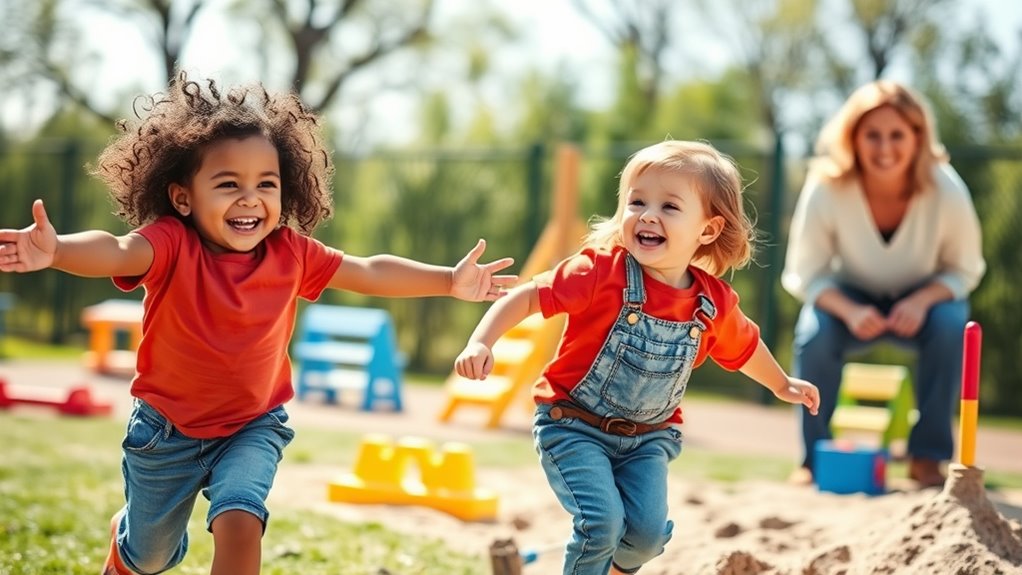
Various factors greatly influence a toddler’s social skill development, shaping their ability to interact with others. Genetic predispositions can affect temperament and personality, while environmental risks—like unsafe neighborhoods or poor childcare—can hinder growth. Additionally, high-quality interactions with caregivers can significantly enhance a toddler’s social capabilities. Engaging in activities that promote healthy breakfast choices can also support cognitive development, which is important for social skills. The foundations of social skills often stem from early peer interactions, helping children develop empathy and understanding of others’ feelings. Incorporating elements of holistic living can further enrich a child’s emotional and social growth.
Numerous factors, including genetics and environment, significantly shape a toddler’s ability to develop social skills and interact with others.
Family dynamics, such as maternal depression or violence, also play a notable role. Cultural beliefs guide social norms, impacting interactions. As a parent, your behavior serves as a model; toddlers learn through imitation. High-quality interactions between you and your child provide essential emotional support. Engaging in cooperative activities fosters teamwork and social skills.
Early peer relationships and group activities enhance their understanding of social cues. Finally, choosing quality childcare with trained educators supports their development considerably. Additionally, emotional disconnection can impede a toddler’s ability to form healthy relationships later in life.
Neural and Behavioral Mechanisms of Social Interaction
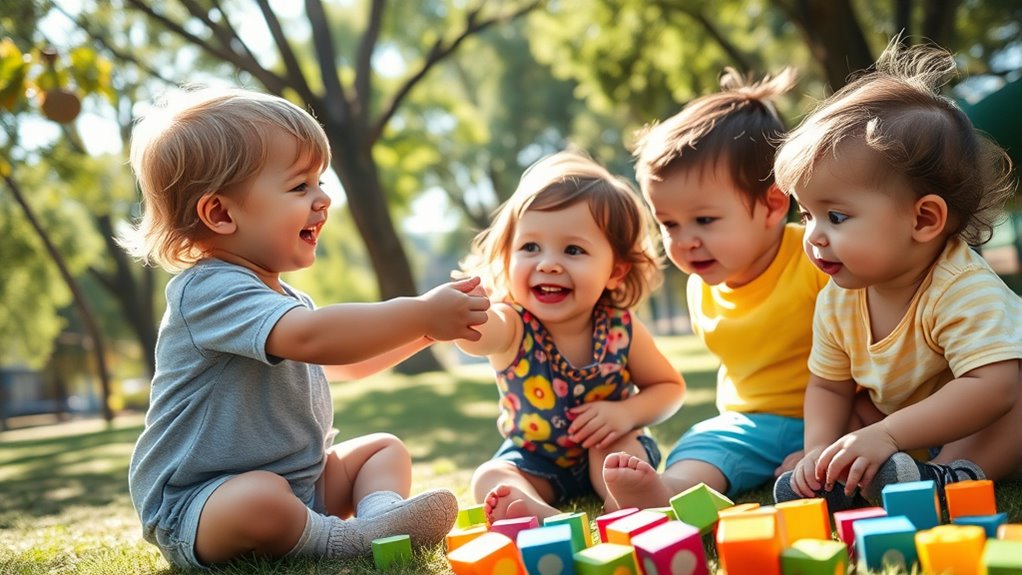
As toddlers grow, the neural and behavioral mechanisms driving their social interactions become increasingly evident. From birth, you’re likely to notice your child’s preference for faces and biological motion, indicating their innate social abilities.
By three months, they start engaging in essential interactions with caregivers, which support brain development. Key brain areas, like the superior temporal sulcus, become active as they process social stimuli. Your toddler will begin imitating peers and using non-verbal cues to communicate. During this time, emotional dysregulation can also impact their interactions, as toddlers may express intense feelings in response to social situations.
As they reach 13 months, they develop a theory of mind, enabling them to understand others’ intentions. Through these evolving neural networks and behavioral patterns, your child lays the groundwork for successful social interactions and relationships. This development parallels the way new Bitcoin holders influence market dynamics, reflecting strong demand and adaptation in response to social cues.
Long-Term Impact of Early Social Skills on Life Success

When children develop strong social skills early on, they set themselves up for long-term success across various aspects of life. These skills enhance emotional intelligence, helping you manage relationships effectively.
If you nurture these abilities, you’re more likely to achieve academic success, leading to better career opportunities in adulthood. Strong social skills also reduce the risk of engaging in negative behaviors, like bullying, during adolescence.
As you grow, these skills contribute to improved mental health, lower anxiety, and greater resilience. Establishing friendships early on lays a foundation for lifelong relationships, boosting overall life satisfaction.
Frequently Asked Questions
How Can I Encourage My Toddler’s Social Skills at Home?
To encourage your toddler’s social skills at home, set up imaginative play scenarios, like a restaurant or store, where they can negotiate roles.
Model sharing and kindness in your interactions, and arrange frequent playdates for peer interaction.
Engage in cooperative activities, like puzzles or games, to teach teamwork.
Use storytelling to discuss emotions, helping them express feelings.
Finally, praise their efforts to share and cooperate, reinforcing positive behaviors.
What Signs Indicate My Child May Struggle With Social Skills?
If you’re concerned your child might struggle with social skills, watch for signs like difficulty making eye contact or frequent aggression towards peers.
Notice if they can’t imitate gestures or initiate conversations. They might also avoid playing alongside others or fail to engage in turn-taking games.
If your child relies heavily on you in social settings or struggles to express emotions, these could be indications of social skill challenges.
Are There Specific Toys That Promote Social Interaction in Toddlers?
Imagine a bustling marketplace where children trade laughter and ideas.
You’ll find that specific toys, like dolls and building sets, act as bridges, connecting toddlers to each other. Role-playing toys spark imaginative conversations, while interactive games encourage teamwork.
When you introduce these treasures into playtime, you’re not just providing entertainment; you’re nurturing their ability to communicate, empathize, and cooperate.
These toys are the keys to opening a world of social interaction for your little one.
How Do Cultural Differences Affect Toddler Social Skill Development?
Cultural differences greatly shape how you see toddlers develop social skills.
If you’re in a collectivist culture, you might notice children valuing group harmony, often suppressing their personal emotions. In contrast, individualistic cultures encourage open emotional expression, fostering strong peer relationships.
These cultural norms not only influence how toddlers interact but also impact their ability to empathize and understand boundaries, ultimately affecting their social experiences and skill development.
When Should I Seek Professional Help for My Child’s Social Skills?
Did you know that about 1 in 6 children experience social skill challenges?
If you notice your child consistently struggling with interactions—like not responding to their name or having frequent conflicts with peers—it’s time to seek professional help.
Early intervention can make a significant difference. Consulting therapists or specialists can provide strategies to enhance your child’s social skills, fostering better communication and emotional regulation for healthier interactions in the long run.
Conclusion
To sum up, nurturing your toddler’s social skills isn’t just about playdates; it sets the foundation for their future success. You might think it’s too early to focus on social interactions, but these early experiences shape their ability to connect with others later in life. By actively engaging in their social development now, you’re giving them valuable tools that will benefit them for years to come. Don’t underestimate the power of these early connections—they truly matter!
